Alan Taylor of the University of Virginia examines the early origins of the War of 1812. In many ways it served as the final act of the American Revolution. During the revolution, the American patriots risked their new nation on a republic, then a risky and radical form of government where sovereignty derived from a broad electorate. In a second great gamble, they sought to sustain that new republic on a vast and unprecedented scale: the eastern third of a continent.
-
Article 1: Uneasy neighbors: Rival political systems in North America
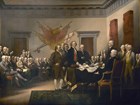
The War of 1812 served as the final act of the American Revolution, which was a complex and prolonged drama that lingered for a generation beyond the peace treaty of 1783 and the Federal Constitution of 1787. Read more
-
Article 2: Slow drift to a new war
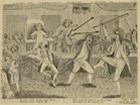
In many ways, the War of 1812 began as soon as the War of Independence ended. This new nation struggled to find a place in a broader geopolitical world, leading to domestic tension. Read more
-
Article 3: The high stakes of political partisanship
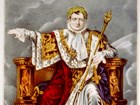
Neither the Federalists nor the Republicans accepted the legitimacy of the other party. Both cast their opponents as a selfish and destructive faction bent on perverting the fragile republic. Ironically, that dread of parties drove each group to practice an especially bitter partisanship. Claiming exclusively to speak for the people, each party cast rivals as insidious conspirators bent on destroying freedom and the union. Read more
-
Article 4: A commercial war with the "Mistress of the Seas"
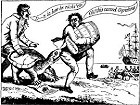
Meanwhile, relations with Great Britain worsened over the growing American commerce with France and her colonies. By 1807, the French Revolution had collapsed in a coup that elevated a military genius and despot, Napoleon Bonaparte, who created an empire from the ruins of the French republic. Read more
-
Article 5: Stark alternatives: War or compromise?
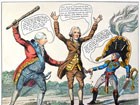
The failure of the embargo left the Republicans with two stark alternatives: wage war or submit to British domination on the high seas. The Federalists favored tacit submission as more profitable and less dangerous—given the shrunken and demoralized state of the American military cut to the bone by Jefferson. Read more
